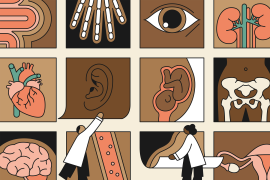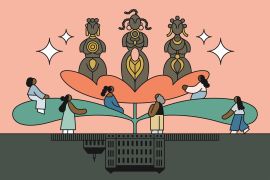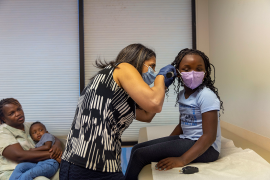While the economy is beginning to recover from a deep recession, the job market has lagged painfully behind—leaving 13.7 million people unemployed, many for extended periods. For many families, the loss of income is compounded by a loss of health benefits. There are few affordable options for health insurance comparable to employer coverage, and consequently millions of adults who have lost their jobs and benefits are going without insurance. This means that already stretched family budgets are vulnerable to catastrophic losses and bankruptcy in the event of a serious accident or illness, and that families face significant financial barriers when trying to obtain needed medical care and timely preventive services.
Using data from The Commonwealth Biennial Health Insurance Survey of 2010 and prior years, this report examines the effect of the recession on the health insurance coverage of adults between the ages of 19 and 64 and the implications for both their finances and their access to health care. The survey of 3,033 adults, conducted by Princeton Survey Research Associates International from July 2010 to November 2010, finds that in the last two years a majority of men and women who lost a job that had health benefits became uninsured. Adults who sought coverage on the individual insurance market over the past three years struggled to find plans they could afford and many were charged higher premiums, had a health condition excluded from their coverage, or were denied coverage altogether because of a preexisting condition. Meanwhile, Americans with health insurance had higher deductibles and consequently greater exposure to medical costs. And millions were struggling to pay medical bills, facing cost-related barriers to getting the care they need, or skipping or delaying needed care, including prescription medications, because of the cost.
These survey findings demonstrate that the passage of the Affordable Care Act last year was critical to the future health and well-being of working families. The survey was fielded during a time when early provisions of the law were just being implemented; the major provisions of the law will go into effect in 2014. While the United States will surely suffer from challenging economic times in coming years, when the law is fully implemented, people will still have health insurance even if they, or a family member, become unemployed. Families with low and moderate incomes in particular will benefit from newly subsidized sources of health insurance, including Medicaid and private health plans. And no one will be charged a higher premium because of a health problem, have a health problem excluded from coverage, or be denied coverage when they seek to buy a health plan. As the law's provisions go into effect, the nation's health insurance system will move from one in which 52 million adults suffered a time uninsured in 2010 to one in which few people will be without health insurance, even during a recession.
SUMMARY OF SURVEY FINDINGS
Millions of Adults Lost Their Jobs and Health Benefits in Past Two Years
- Nearly one-quarter (24%) of working-age adults—an estimated 43 million—reported that they and/or their spouse had lost their job within the past two years.
- Among respondents who reported a job loss in their family, nearly half (47%) said that either they or their spouse had received health benefits through the job that was lost.
- Among respondents who had health benefits through their jobs and lost their jobs, nearly three of five (57%) became uninsured. Just one-quarter were able to go on to their spouse's insurance or found another source of coverage. Only 14 percent continued their coverage through COBRA.
Few Affordable Insurance Options for Workers Who Lose Their Jobs and Benefits
- An estimated 26 million adults said that they bought or tried to buy a health plan in the individual market between 2007 and 2010.
- More than two of five (43%) or an estimated 11 million adults who ventured into the individual market said they found it very difficult or impossible to find a plan with coverage that fit their needs.
- Sixty percent or 16 million adults who shopped for coverage in the individual market found it very difficult or impossible to find a plan they could afford.
- More than one-third (35%), or 9 million people, were turned down by an insurance carrier because of a health problem, charged a higher price because of a health problem, or had a specific health problem excluded from their coverage.
- An estimated 19 million people, or 71 percent of those who attempted to buy a health plan in the individual market in the last three years, cited any one of those problems.
Number of Adults Who Spent a Time Uninsured Has Increased over Past Decade
- Nearly three of 10 (28%) working-age adults, an estimated 52 million people, were uninsured for at least some time during 2010, up from 38 million or 24 percent in 2001.
- Adults in families with low and moderate incomes were most at risk of going without coverage: more than half (54%) of adults with incomes under 100 percent of the federal poverty level ($22,050 for a family of four) and 41 percent of those with incomes between 100 percent and 199 percent of poverty ($44,100 for a family of four) were uninsured for a time during the past year. This is compared with 13 percent among households with incomes at or above 200 percent of poverty.
- Young adults and minorities were also without coverage at high rates: 44 percent of 19- to 29-year-olds, 51 percent of Hispanics, and 37 percent of African Americans were uninsured for some time during the year. This is compared with 17 percent of adults ages 50 to 64 and 21 percent of whites.
Adults Are Spending Large Shares of Income on Health Care
- The number of adults who reported spending large amounts of their income on premiums and out-of-pocket costs climbed over the decade. One-third (32%) of working-age adults, or 49 million, spent 10 percent or more of their income on out-of-pocket costs and premiums in 2010, up from 21 percent, or 31 million adults, in 2001.
- In 2010, 31 percent of adults who were insured all year spent 10 percent or more of their income on out-of-pocket costs and premiums, up from 19 percent in 2001. This increase was driven by greater spending on both premiums and out-of-pocket costs.
- The burden of health care costs has spread most dramatically among Americans with the lowest incomes. Among adults earning under 100 percent of poverty, fully half spent 10 percent or more of their income on health care costs in 2010—more than double the share who spent that much in 2001 (21%).
Millions of Adults Are Struggling to Pay Off Medical Debt
- In 2010, two of five (40%) adults ages 19 to 64, or 73 million people, reported some type of medical bill problem, including: problems paying medical bills, being contacted by a collection agency about unpaid bills, having to change their way of life in order to pay their bills, or paying off medical debt. This is up from 34 percent, or 58 million people, in 2005. (Note: We report data from 2005 rather than 2001, since this is the first year the question series was included in the survey.)
- The number of people reporting medical bill problems rose across all of the following measures between 2005 and 2010: 53 million people said they had problems paying bills, up from 39 million; 30 million were contacted by a collection agency about unpaid bills, up from 22 million; and 31 million said they had to change their way of life in order to pay their bills, up from 24 million. Nearly a quarter (24%), or 44 million people, said they were paying off medical debt, up from 37 million in 2005.
- Medical bill problems led people to make significant trade-offs, including using up all their savings, not being able to pay for necessities such as food, heat, or rent, incurring credit card debt, taking out a loan or mortgage against their home, or declaring bankruptcy. More than half (56%) or 41 million people with medical bill problems or debt reported making any one of these trade-offs.
Americans Do Not Get Needed Health Care Because of Costs
- Increasingly, cost has become a barrier to getting needed care. Two of five (41%) adults, or 75 million people, said that, because of the cost, they had not been able to get needed care, including not going to the doctor when they were sick, not filling a prescription, skipping a recommended test, treatment, or follow-up visit, or not getting needed specialist care. This was up from 29 percent, or 47 million people, in 2001.
- People who were uninsured during the year reported cost-related problems getting needed care at the highest rates. Two-thirds (66%) of adults who were uninsured at the time of the survey cited cost-related problems accessing needed health care, up from 55 percent in 2001.
- Even among adults who had insurance for the full year, 31 percent reported a cost-related problem getting needed care, up from 21 percent in 2001.
- A quarter (25%) of adults with a chronic condition who took prescriptions regularly said they had skipped doses or not filled a prescription for their health condition because of the cost. And more than half (52%) of uninsured adults with a chronic condition skipped doses or did not fill a prescription for their condition because of the cost.
Adults Who Lack Health Insurance Are Less Likely to Get Preventive Care
- Only half of all adults ages 19 to 64 were up to date on the following recommended screenings: blood pressure and cholesterol checks, Pap tests, colon cancer screenings, and mammograms.
- Lacking health insurance makes it far less likely that people will get any type of preventive care tests. Just over a third (36%) of adults ages 50 to 64 who were without insurance during the year said they had been screened for colon cancer in the past five years, compared with 57 percent of those who were insured all year.
- Among women ages 50 to 64 who were uninsured during 2010, just 42 percent had received a mammogram in the past two years, about half the rate (79%) reported by those who had coverage throughout the year.
HOW THE AFFORDABLE CARE ACT WILL BRING RELIEF
Universal Coverage in 2014
Beginning in 2014, the Affordable Care Act will provide comprehensive coverage to nearly all 52 million adults who went without health insurance for all or part of the year in 2010 and who are legal residents.
New coverage under Medicaid. Up to 26 million of these uninsured adults—those with incomes under $29,327 for a family of four—will gain coverage in 2014 through Medicaid, with
little or no premium or cost-sharing expenses. Such comprehensive coverage will help reduce the high rates of out-of-pocket spending, medical bill problems, and cost-related problems getting needed care that were reported by people in this income range. Medicaid coverage should also increase the ability of people to get needed preventive care.
New subsidized private health plans with consumer protections. Up to 17 million adults who were uninsured in 2010 with incomes between $29,327 and $88,200 for a family of four will have access to tax credits to help them purchase private health plans through new state insurance exchanges. Tax credits will cap the amount of income that people spend on premiums on a sliding scale, ranging from 3 percent to 9.5 percent, and there will be income-related limits on cost-sharing. In addition, new consumer protections will ban health insurers from denying coverage or charging higher premiums because of preexisting health problems.
New private health plans with consumer protections. Up to 3 million adults who were uninsured in 2010—those with incomes above $88,200 for a family of four—will be able to purchase private plans with comprehensive benefits through the new state insurance exchanges or individual market. No longer will they be denied coverage or charged higher premiums because of preexisting health conditions.
Early Reforms: 2010–14
Several early provisions in the Affordable Care Act that have gone into effect in the last year are also providing temporary relief for people who do not have health insurance through a job.
- People who have health problems and have been uninsured for at least six months may be eligible for new preexisting condition insurance plans, which are available in all 50 states and the District of Columbia.
- All young adults up to the age of 26 may stay on or enroll in their parents' health plans if they include dependent coverage.
- Small businesses are now eligible for tax credits to offset the costs of their health insurance premiums.
- Insurance carriers are banned from denying coverage to children with preexisting health problems or excluding such conditions from their policies.
- Insurers are banned from placing limits on what plans will pay over enrollees' lifetimes and from rescinding coverage when someone becomes ill. Carriers must phase out annual limits on benefits over the next three years.
- Health plans must provide coverage of recommended preventive services without cost-sharing.
CONCLUSION
U.S. families continue to suffer the lingering effects of one of the most severe economic downturns since the Great Depression. Millions of families have lost their health insurance along with their jobs, with devastating consequences for working families, particularly those with low and moderate incomes. Beginning in 2014, the Affordable Care Act will help ensure that nearly everyone has access to affordable and comprehensive health insurance, regardless of his or her employment status. This means that nearly all of the 52 million working-age adults who were without health insurance for a time last year will be covered in 2014, most with subsidized premiums and reduced cost-sharing. In addition, their health benefits will have to conform to an essential benefit standard ensuring they have access to the full spectrum of benefits enjoyed by people in employer-based plans, and no one will be charged a higher premium or denied coverage because of a preexisting health condition. Once the law is fully implemented, U.S. families will finally have financial and health security provided by a continuous source of coverage, both in good economic times and bad.


